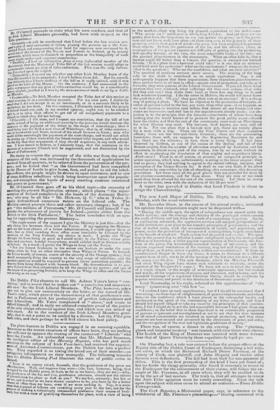The place-hunters in Dublin are engaged in an amusing squabble.
Numerous as the recent creations of offices have been, they are nothing like sufficient to appease the craving of the cormorant " Liberals" who beset the Castle. An unfounded report that Mr. Michael Staunton, the intelligeut editor of the Morning Register who hiss paid machattention to the subject of Irish Poor-laws, had received the appoint- ment of Assistant. Commissioner, put the Dublin bar into a perfect fury. They regarded it as taking the bread out of their mouths—an outrageous inflingement on their monopoly. The following remarks from the Dublin Evening Post illustrate the state of public virtue in Ireland.
" There is an outcry raised, forsooth, that the gentlemen of the press are office.hunters. Well, and suppose they were—(the fact, however, being, that is regard to the Dublin press at least, as far as we know, they are not)—why, You gentlemen of the be, and you, gentlemen ettornies, should not the editors of journals look for place as weN as you ? We are few, certainly; but few as We are, and devoted as we have shown ourselves to be, you have by far a better chance of office than we have even if we were seeking it. Nay, it is nom. Mous that a parcel of fellows are crowding every year to the bar, nut for the purpose of making a ridiculously overstocked profession their means of liveli- bood, but with a view of qualifying themselves for place, with a view of being
in the market—their wig being the piecard, equiveleut to the well-heewn
• Wha wahto ale?' celeln and III ilurni.hrey Om& r. And yet these are ti.e
gentry that have the impudence to cry out against the press; as if the preetie
men aid not knew as ell, how often—to their on n co 4, to the jeopardy of their prom:ley, 1111.1 to flu it peace of mind—the prees Its been employed to promote their object.. In feet, the gentlemen of the be, and the ;unlinks, (who, in
consequence of the wetter expense and difficulty of getting into the profession, will speedily become, of the two, the more respectable limbs of the law,) are
the greatest place-hunters in the community. When an office falls in, that a layman might fill better than a lawyer, the question is amongst our learned friends, Is it a place that a barrister could take ? is it one that an attorney could hold with his profession? what are the emoluments? what are the ditties? (that is the question.) Who are the candidates, and what are their interests?' The question of previous services never occurs. The teeming of the long robe or the blunt is considered as an ample equivalent. Nay, it not unfrequently happens that these importunate, these shameless place-Inintere- these petfect bores to all men in office—assume airs of protection, and talk, as if forsooth, they were patrons of the Liberal Government. If you ask them what services they ever rendered, what sufferings did they ever endure, whit risks did they ever run? they shake their head, as there was any thing in it, and look wondrous; knowing. Like the miser in Moli(!re, the world will never know the good they did. Oh yes! they gave their vote at an election ! It is a cheap way of getting a place. We have no objection to the ptomotion of lawyers, or rather of persons called to the bar, any more than other men--it so happens, as we took occasion to mention once before, that almost all our friends and asso- ciates are barristers—and still less to the appointments already made : our ob- jection is to the principle, that the lawyers—nine-tenths of whom have done nothing that the world knows of to promote the great public cause—should have the choice, and that the rest of the community must wait on Providence for wheat Heaven may send. The lawyers, God knows, are very well off as it is. For one place that a layman may get, there are twenty places for a man with a wig. There are the Four Courts and their countless offices; there are the two•and- thirty Counties; there are the prosecuting barristers ; there will, we suppose, be the Registering Barristers by and by ; there are the colonies; in fact, there is every thing. It has been nbserved by Gibbon, as one of the causes of the decline and fall of the Roman empire, that the number of advocates employed by Justinian and his successors, in alntost every part of the empire, was by no means without its effect in accelerating the dissolution of that mighty and magnificent fabric. Absit omen I There is, at all events, at present, an antagonist principle in active operation, which was, unfortunately, wanting in the lower empire: they had no press; they had nothing to oppose to the eternal talking, intrigue, and
corruption of the Grmco Roman be. It shall be our own fault, if we allow ourselves to be over-ridden by thee all absorbing, this cormorant, this devouring generation. Let them enjoy all the good places that are provided fur them by our glorious constitution, and for them alone. They are nine or ten times more than those allotted for the rest of the community. Let thou in mercy leave us the tithe, even with the deduction of the 25 per cent."
A report has prevailed in Dublin that Lord Plunkett is about to resign the Chancellorship.


























 Previous page
Previous page